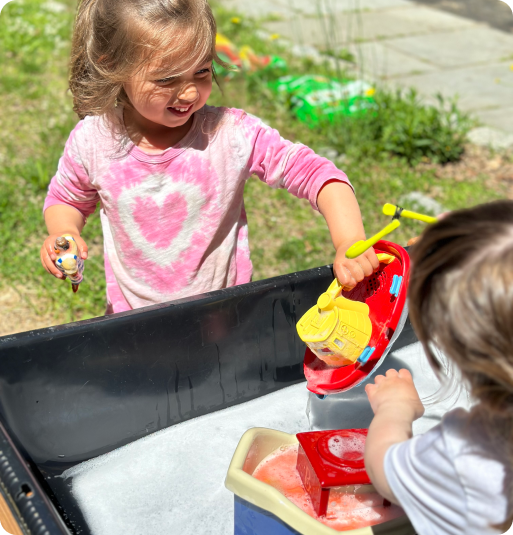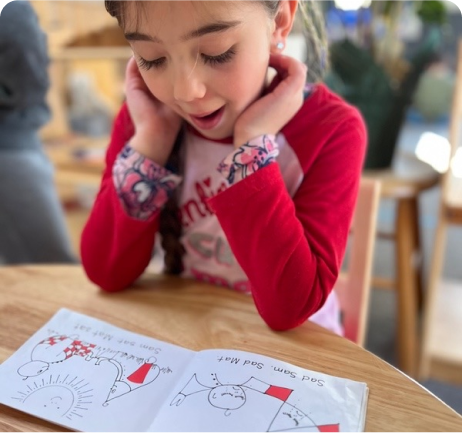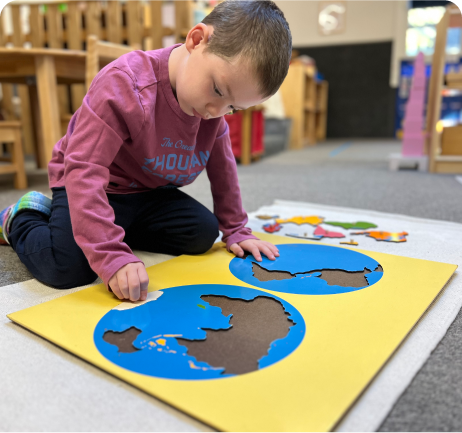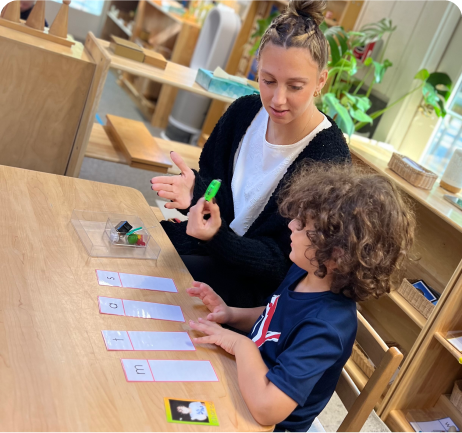Children’s House
at Sandwich
The Montessori preschool that supports the social, emotional, cognitive, and physical development of the child.
We welcome you to visit and pre-register for summer and fall 2026 enrollment opportunities!
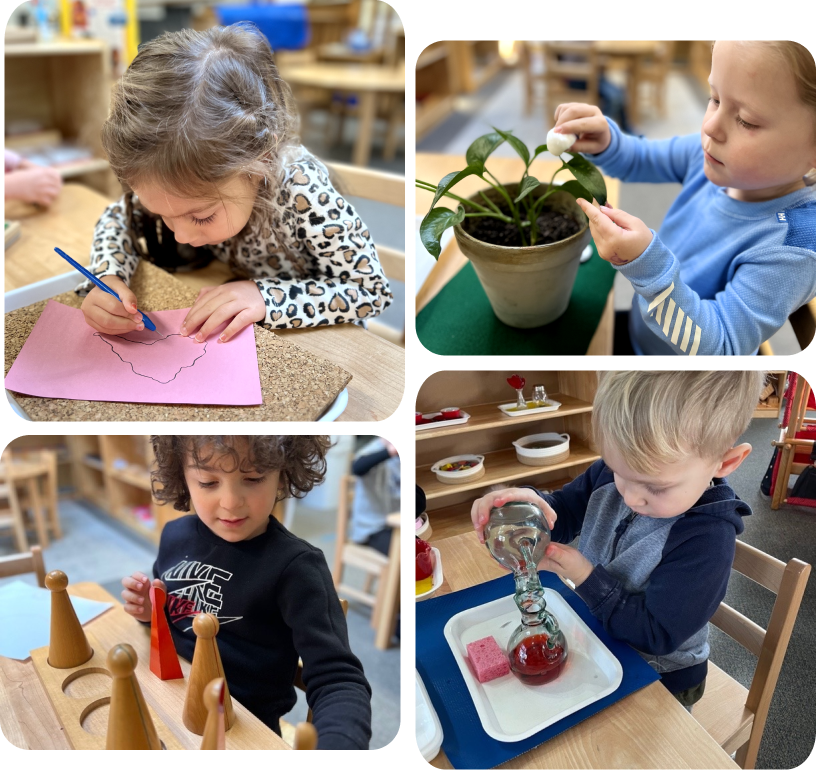
Explore the Program
Visit the campus or request more information
Children’s House for Ages 3-6
This is our 2.9-6 program, and has been in continuous operation since 1998. Our focus on nature and making connections with the natural world continues within our preschool program. In addition to daily lessons, we work to continually bring the outdoors in and the indoors out. As part of an individualized program we help each child become independent. Every child is given the opportunity to progress at his or her own pace and developmental level.
The three-year cycle is a fundamental element of Montessori education. Within this model, the youngest child looks to and learns from her older peers, who act as role models and classroom leaders. The child remains in the same classroom for three years, beginning as a three-year-old and finishing as a Kindergarten student.
During the integral uninterrupted work cycle, children engage in learning through the areas of Language Arts, Mathematics, Cultural Studies, Sensorial, Practical Life, Performing Arts, Science, Physical Education, History & Geography, Music.
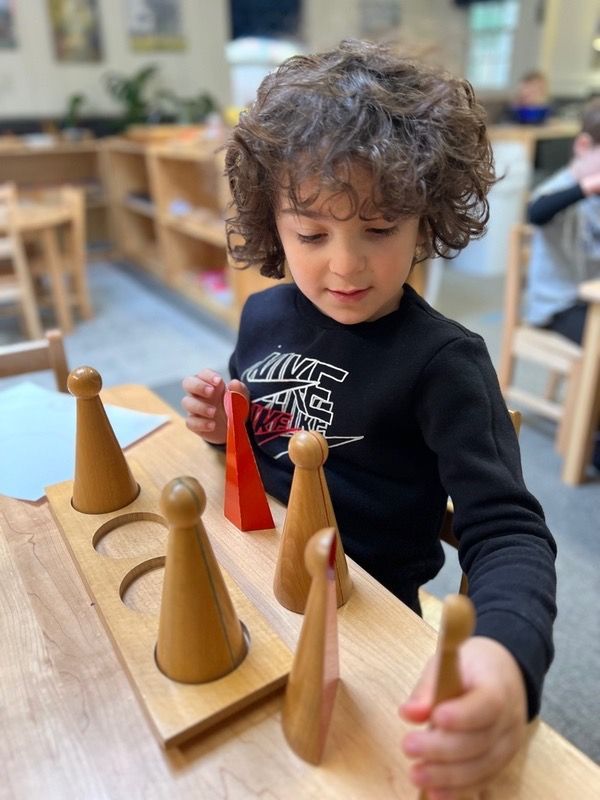
Children’s House Curriculum
Language Arts
Language activities focus on building vocabulary, syntax, and speaking skills through conversations and peer modeling. Children develop print awareness and left-to-right orientation using books, language cards, and puzzles. Activities like picture sequencing, read-alouds, and guided questions enhance their ability to classify and communicate effectively.
Mathematics
Children explore numbers, counting, and basic operations through hands-on activities that introduce one-to-one correspondence, linear counting, and place value. They also begin to understand time, money, fractions, and measurement, laying a foundation for mathematical concepts with engaging tools like number rods and balance scales.
Cultural Studies
Children delve into science with a focus on botany and zoology, learning about plant life, animals around the world, and life cycles. They explore geography through maps and landforms, discovering the world's cultures and biomes. History introduces the concept of time, using calendars and clocks to understand the passage of days, weeks, and seasons.
Sensorial
Sensorial activities sharpen children’s senses and cognitive skills, helping them develop sequencing, visual, auditory, and tactile discrimination, and spatial awareness. Through engaging tasks like puzzles, color matching, sound and smell jars, and food-tasting, children refine their eye-hand coordination and understanding of object permanence, laying the groundwork for more complex learning.
Practical Life
Children refine their fine motor skills through grasping, tweezing, tonging and scooping activities. They are strengthening their skills in independence and responsibility through activities like flower arranging, plant care, food prep, and sewing. They learn respect, cooperation, and coordination, enhancing fine and gross motor control. Lessons in grace and courtesy foster a strong sense of community and respect for their environment.
Performing Arts
Art activities focus on self-expression and creativity, with projects that develop fine motor skills, color concepts, and coordination. Children experiment with different mediums and techniques, encouraging independence and imaginative thinking.
Science
Science, in the 3-6 classroom, begins by exploring living things, in addition to other scientific topics. Two main topics of study are botany (the study of plants) and zoology (the study of animals). Children explore the natural world through botany and zoology, learning about plant systems, animals around the world, and life cycles. They engage in hands-on activities that teach them to classify plants and animals, understand different root types, and observe the life cycles of various species, fostering a deep connection to nature.
Physical Education
Physical activities are integrated throughout the day, promoting gross and fine motor skills, coordination, and teamwork. Through games, sports, and movement exercises, children learn the value of physical health, cooperation, and respect for others, all while having fun and staying active.
History & Geography
History lessons introduce the concept of time, helping children understand days, weeks, months, and seasons. Geography expands their awareness of the world, teaching them about continents, oceans, and cultural diversity. Through maps, globes, and cultural studies, children develop a sense of global awareness and respect for different traditions and ways of life.
Music
Music sessions engage children in activities like keeping a steady beat, matching pitch, and exploring musical opposites. They participate in simple dances, use movement to express music, and learn to differentiate between singing and speaking voices, fostering a love for rhythm and melody.
Children’s House Faculty, 3-6 Program

Annalise Rogorzenski
Teacher Leader

Monika Gomes
Children's House Lead Guide

Erin Wilcox
Teaching Partner
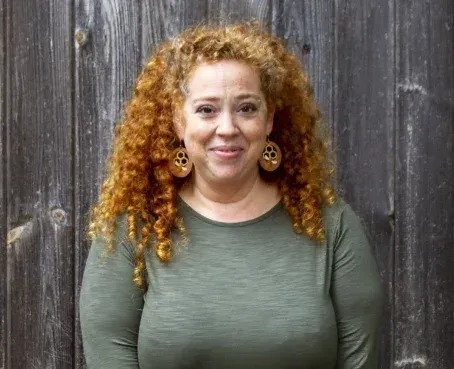
Sarabeth Gall
Teaching Partner
The Guiding Principles At Sandwich Montessori
We guide children to be kinder, braver, and stronger, equipping them with empathy and courage to make a difference in the world.
We empower kids to lead by example, take responsibility, and support their peers, building leadership skills that start in the classroom.
Our students learn the value of teamwork and respect, understanding how their actions can positively impact their community.
At SMS, we encourage children to explore their passions through hands-on learning, fostering a love for knowledge that goes beyond the classroom.
We nurture curiosity by encouraging kids to ask questions, think critically, and engage in meaningful conversations.
We blend classical education with Montessori principles, inspiring children to think deeply and connect with the world through timeless ideas.
Nature is central to learning at SMS. We integrate outdoor experiences to help children connect with and learn from the natural world.
